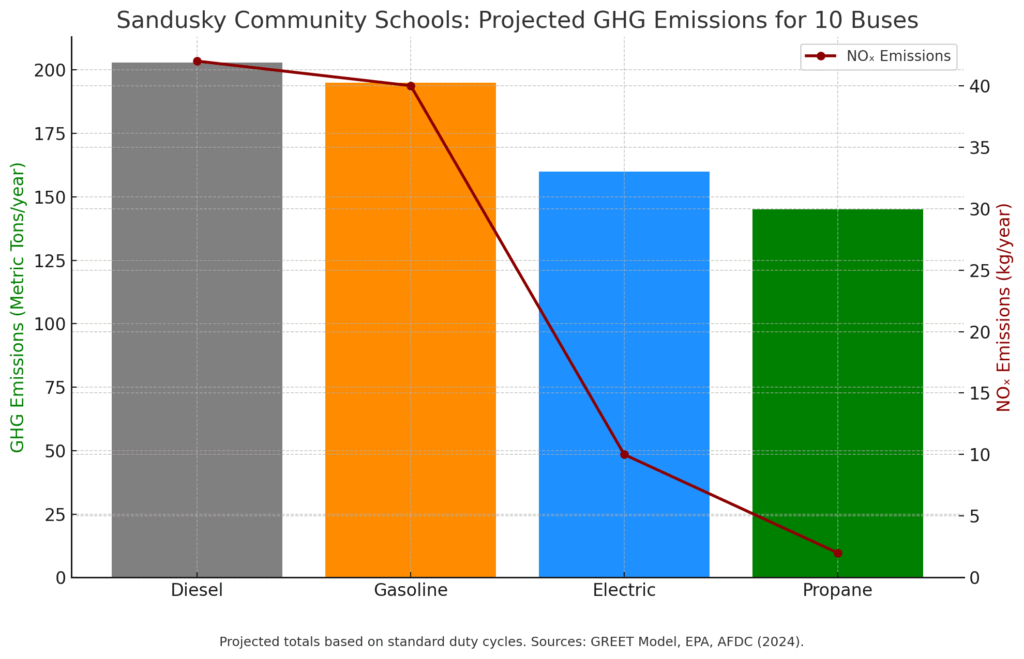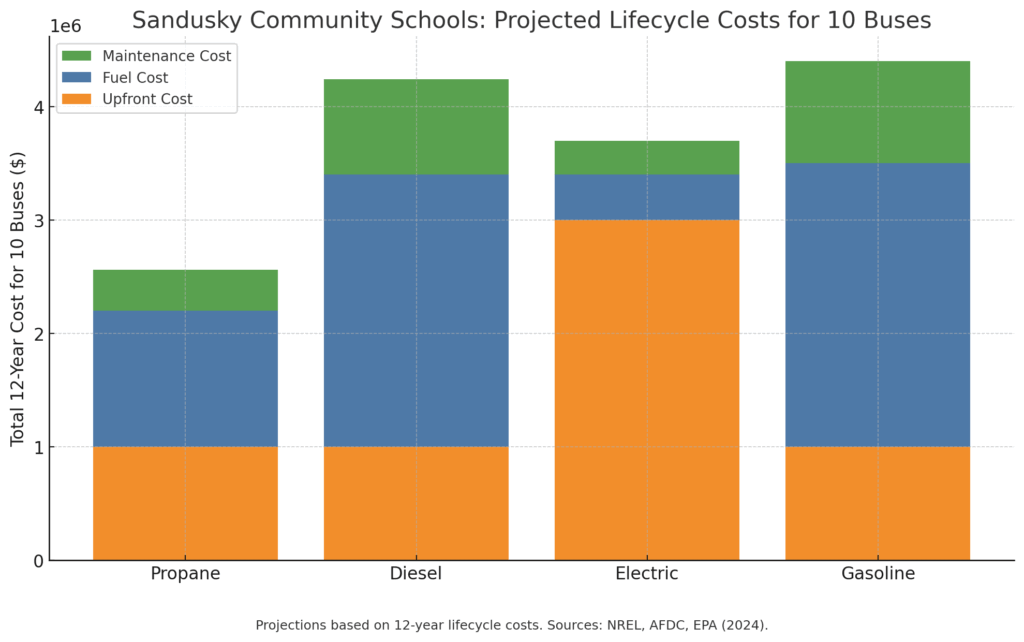Sandusky Community Schools Lead with a 100% Propane-Powered Bus Fleet

Sandusky Runs on Propane
Propane School Bus Fleet – 10
Total Fleet Size – 10
100% of the fleet runs on Propane
Savings: $10,000/year per bus
Sandusky Community Schools, in Sandusky, Mich., was an early adopter of using a cleaner fuel for their school bus fleet. Since 2014, the school district has been replacing its diesel school bus fleet with a clean, cost-effective fuel – propane. The result? significant school budget savings, lower emissions, and a better ride for students and drivers alike.
Sandusky’s school buses log approximately 14,000 miles a year, transporting nearly 450 students—proving that even a small rural district can lead the way with affordable, forward-thinking transportation.
Propane–A Clean, Green Fuel
Propane is a low-carbon, nontoxic alternative fuel that won’t contaminate air, soil, or groundwater. It’s the third most commonly used transportation fuel in the world—after gasoline and diesel—and is officially classified as an alternative fuel under the Energy Policy Act of 1992.
Sandusky’s propane buses contribute to cleaner air by reducing harmful tailpipe emissions, helping create a healthier environment around the school district, bus stops, and the community.
Steve Pardy, Transportation Director at Sandusky Community Schools, reported in a recent interview with the Michigan Propane Gas Association, “We are saving over 40,000 lbs of CO2 annually with our propane buses versus diesel.”
According to the U.S. Department of Energy, propane buses reduce nitrogen oxide emissions by up to 96% compared to diesel, while delivering reliable and efficient performance in cold climates.

Lower Costs, Less Hassle
Propane costs less per gallon than diesel or gasoline, and because it has low emission levels, it puts less strain on the engine. That means fewer maintenance issues, fewer service disruptions, and more reliable service. Altogether, that significantly frees up the budget to be reinvested in the school district.
Propane buses also eliminate the need for expensive diesel DEF treatments and other fuel additives, thereby reducing long-term maintenance costs and making it easier on mechanics.
Steve stated, “We switched to propane in 2014. And we switched because of its cost efficiency compared to diesel. We save roughly $10,000 per bus annually due to the efficiency of propane and maintenance on the bus; our maintenance on the buses is very minimal.”
“I love propane buses due to the quietness, cleanliness on fixing the buses, saves the district money, it's a clean, green fuel, and good for Sandusky Community Schools.”
Steve Pardy, Sandusky’s Transportation Director
A Safe Fuel
Propane-powered school buses are a safe and proven choice for student transportation. More than 700 propane-powered buses run on Michigan roads, serving over 40 school districts. Their fuel tanks are built to withstand rigorous conditions, made from carbon steel, and designed to meet the strict safety standards of the American Society of Mechanical Engineers. Propane tanks are 20 times more puncture-resistant than gasoline or diesel tanks, giving drivers and parents extra peace of mind.
Propane also has a narrower flammability range than gasoline and diesel, thereby reducing the risk of an accidental ignition. Additionally, every onsite propane fueling station is equipped with a lock-off valve that automatically stops the flow of propane if a pressure drop is detected anywhere in the system, providing an extra layer of safety for school fleets.
An Easy Upgrade from Diesel to Propane
Transitioning a school bus fleet to propane, a clean fuel, is relatively easy when considering all of its benefits. Steve reported that the transition was so easy; they had purchased propane buses every year and eliminated diesel ones from their fleet over the years, resulting in a 100% propane-powered fleet.
Most schools contact their local propane company to procure a propane contract and have a propane storage tank installed on-site, like Sandusky did. “To install infrastructure, it was very easy. We just called our main propane dealer, and they did all the work for us,” Steve reported.
However, there are other fueling options available to schools, such as public fueling stations and mobile fueling services. “To fill the bus, it is very easy”, as Steve mentioned, “there is a little extra training, but the propane company does that [training] every 2 years.
Propane That Performs—Even in the Cold
Propane buses are cold-weather ready. They start up reliably and warm quickly—a must-have during snowy mornings in the Thumb region.
“The propane buses perform better in the wintertime than diesel. They don’t have to be plugged in, you can start them whether it is 30 degrees below or 40 below,” Steve explained. Drivers no longer need to idle buses for extended periods or worry about frozen fuel lines like they did with diesel.
Propane school buses do not need extra fuel additives, unlike diesel and gasoline units. Pardy even reported that the school district saves money on their winter electric bill, because propane doesn’t require block heaters, like their diesel units required in the past.
$6,000 Available from the Michigan Propane Gas Association
The Michigan Propane Gas Association includes propane fleet vehicle experts who can answer your transportation questions and to help make a transition to propane smooth for your district. The MPGA also funds its propane fleet rebate, up to $6,000, to those new to propane.

